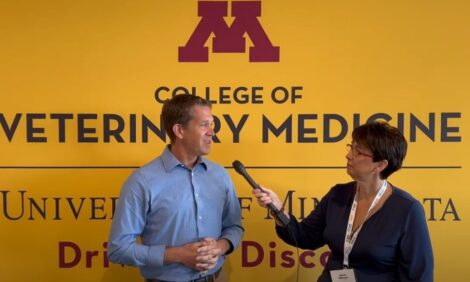



PIC's Banks Baker on the role of genetics in a more sustainable pork industry
The clock is ticking for all of agriculture to build their own solutionNo matter your stance on climate change, greenhouse gas emissions or the role agriculture plays in the issue, one thing is certain. The clock is ticking for all of agriculture to build their own solution because consumers, industry stakeholders, corporations and governments are all lining up to do it for us.
Banks Baker with the Pig Improvement Company (PIC) started his presentation to the delegates at Banff Pork Seminar 2023 with a look at the increasing focus globally on reducing emissions levels, the use of taxes and levies on imports, and the direction retailers are heading when it comes to the sustainability of the products they sell.
"Agriculture is being asked to do a lot - animal health and welfare, antimicrobial stewardship, food affordability, positive climate action," says Baker. For example over 1,400 companies are working with the Science Based Targets initiative (SBTi)- think McDonalds, Target, Cargill, Tyson, Walmart, Maple Leaf Foods, JBS - to set their own corporate goals and targets. Now SBTi companies represent over a third of global market capitalization, worth $38 trillion USD.
Governments including Canada and the United States are enacting policy for stretch targets for the next seven to 30 years with net zero being the goal by 2050. These policies could mean billions in lost value for farm and food investors if they do not meet these targets.
Measure what matters
To truly understand what role genetics can play in improving the environmental footprint of something like PRRS (Porcine Reproductive and Respiratory Syndrome) a Life Cycle Assessment (LCA) is conducted. An LCA is a cradle-to-grave method of assessing environmental impacts associated with all stages of a product's life.
"Historically, the impact of genetic improvements on sustainability have been undervalued," says Baker. "PIC and the National Pork Board are investing in a framework that will allow producers to quantify and claim credit for the value they create through genetic improvement.
The framework being developed should demonstrate how genetic improvements support sustainable pork production and can deliver on climate pledges. Once completed the framework will be shared with other swine genetics companies, and will allow them all to build standards and a pathway to achieving the claim that could be replicated around the world.
The current LCA has four deliverables. First it will credibly model GHG reductions and provide defensible quantification of these reductions. Next, in collaboration with industry partners, it will define and create a pathway to the claimed reductions. Third, a pilot will be run to test the framework and claims of improvements using genetic improvements. And finally it will be codified as an industry standard and replicated in pork markets globally.
The focus of the current LCA work is on PRRS-resistant pigs and the impact that advancement could have not just on the environmental footprint but also on animal health, and the economic and emotional well-being of pork producers.
If successful, this technology is a possible solution to animal health issues in other species as well such as Avian influenza, Bovine Respiratory Disease, and of course African Swine Fever.
Quadruple bottom line: People, Pigs, Planet, Profit
For 60 years PIC has been working on genetic improvements in pigs. These improvements lead to benefits for people (producers), the pigs, the planet and for profit.
For people these genetic improvements have supported food security; improved animal health and welfare which leads to less physical labour and reduced emotional stress; and more sustainable farms.
For the pigs, genetic improvements lead to improved disease resistance, vitality; improved health and welfare; reduced need for antibiotics; and reduced morbidity and mortality.
For the planet, more efficient feeding reduces GHG emissions; lower levels of feed waste, water usage and manure production; and it supports corporate environmental social and governance commitments.
For profit, improved feed efficiency, lower productions costs, and reduced overall input costs improve the bottom line for the producer.
The next step is to build trust with the consumer. PIC is engaging stakeholders and investing in research to further quantify the benefits gene editing will provide the entire value chain to earn market acceptance for the PRRS-resistant pig.
Finally, Baker shared four critical roles of genetic improvements in a sustainable food system.
- Genetic improvement address problems and reduce impacts before they occur
- Raising the right animal is critical to the sustainability of protein production
- PIC has 60-years of experience in improving animal genetics leading to healthier, more robust and efficient animals
- Gene editing is a part of the future of animal health, delivering value and supporting advancement across the full value chain.
One of the most important issues says Baker: "We need to make sure the people who are making the positive change are being rewarded."
That is sentiment pork producers will likely applaud.






